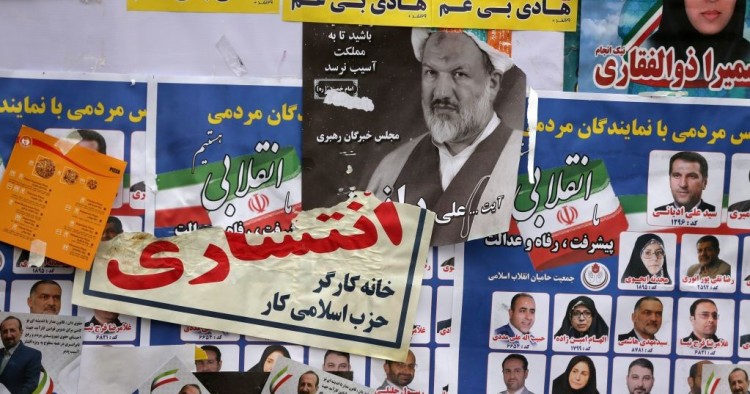The Feb. 21 elections for Parliament in Iran were roundly boycotted by the public. The official turnout was around 20 percent in Tehran and about 40 percent nationally — and both of those figures should to be taken with a big grain salt. This embarrassment, the lowest turnout since 1979, follows repeated pleas by the Islamic Republic’s leaders to turn up at the polls. Regime-supporting senior ayatollahs told the public it was a “religious duty” to vote. Supreme Leader Ayatollah Ali Khamenei asked people to vote, not for the regime, but for the sake of Iran and patriotism. The nerve of it is flabbergasting. Asking people to turn up to vote and participate in a process that is entirely staged, with every candidate pre-approved by Khamenei, is not only a sign of desperation but also a vivid reminder of how detached the ruling Islamist elite is from the wider public.
The outcome of the elections was never in doubt and hardline candidates will largely take over the new Parliament. And undoubtedly, there will be those in the West who will claim that the stiff sanctions imposed on Iran by the Trump administration are the reason why Khamenei engineered the outcome of the elections in such a manner: to show teeth to Washington. If the Americans do not want to deal with Khamenei’s so-called moderate president, Hassan Rouhani, the best way forward is to make them regret it by demonstrating even more Iranian intransigence. After all, Khamenei has done this before. In 2005, he made sure the hardline Mahmoud Ahmadinejad won the presidential elections when the eight years of reformist government by Mohammad Khatami had not, in Khamenei’s mind, changed Washington’s opposition to the Islamic Republic.
Such arguments, linking the extent of political choices for Iranian voters to the state of U.S.-Iran relations, might have a tiny bit of truth in them. But they also reaffirm a much bigger truth: the outcomes of elections in the Islamic Republic are not about the choices the Iranian voters want to make, but about Khamenei’s self-serving calculations. The people are just asked to appear at election time to serve as a prop for this evident political theater.
Alex Vatanka is a Senior Fellow at MEI who specializes in Middle Eastern regional security affairs with a particular focus on Iran.
Photo by ATTA KENARE/AFP via Getty Images
The Middle East Institute (MEI) is an independent, non-partisan, non-for-profit, educational organization. It does not engage in advocacy and its scholars’ opinions are their own. MEI welcomes financial donations, but retains sole editorial control over its work and its publications reflect only the authors’ views. For a listing of MEI donors, please click here.













